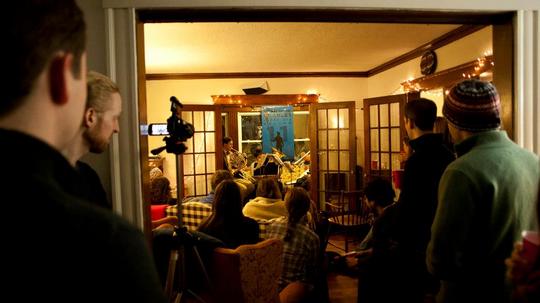
Drop the words "house party," and this neon-soaked image of some 20-something DJ spinning synthpop springs to mind. His robotic beats reverberate off the paper-thin walls of a nearby Allston apartment, attracting the attention of noise violations and curmudgeonly complaints.
Ask Newton-native and recent Columbia University graduate Sam Bodkin how he defines "house party," however, and he'll conjure up images of a string quartet artfully playing Beethoven's "Gro?e Fuge" to a living room full of millennials sitting cross-legged, swigging wine.
Although a self-described "music nerd," Bodkin had never really listened to classical music. That was, until his friend, famed cellist Sebastian Bäverstam, played him the aforementioned tune in 2008 and "something clicked."
Bodkin began working at Tanglewood, the summer home of the Boston Symphony Orchestra, and "had this idea marinating in [his] brain juice" for years. As a college student, he understood how intimidating classical music could be.
"If you go to Symphony Hall, there could be the best musician, but they might as well be a Michelangelo in a museum," Bodkin says over the phone, his passion for the craft clear through his impassioned inflection. "There's this gap between the audience and the performer; like they're not allowed to touch the art."
Bodkin wanted to break that barrier down, and what better way than by bringing 20-somethings together for a chamber music house party?
"This is the golden grail," Bodkin says, introducing his startup Groupmuse.
Similar to other house parties, Groupmuse's origins can be traced back to an Allston apartment. This one was of pianist Cristian Budu, however, who brought a group of New England Conservatory of Music students together, including Bäverstam, to "rattle the rafters with the sweet sounds of Brahms" into the wee hours of the night.
Bodkin was lucky enough to attend a few house parties and undergo an experience capable of "stretching [his] brain and heart." He was still socializing and drinking, but then, for 45-minutes, was stopping and listening to someone "rock [his] world" on the violin. And while they did that, he was free to play the air violin and engage with the music.
"That's another awkward part of the orchestra," Bodkin says, referring to how people can't clap, or can never tell when a concert is over. At a Groupmuse, "I usually walk and rock around," he admits. "That's just what I naturally do when I listen to music."
Through the platform, partygoers can either choose to find a Groupmuse, perform at one or host a gathering instead. Interested hosts can input their location, preferred crowd size and date they want to hold a party. The team will start looking for musicians and, upon the host's approval, start allowing members of the community to RSVP. Groupmuses are often BYOB, so the costs remain negligible. Although, there is one catch.
"We never want it to become a background entertainment thing," Bodkin says. "For 45 minutes, people are going to sit and listen to the music."
Entry into each Groupmuse is donation-based and 21-plus, unless alcohol is not being served. The average attendee is typically 25 years of age or under, largely because the team is trying to cultivate that coveted crowd.
"Even the BSO has trouble connecting to that demographic," Bodkin says.
Yet, what a Groupmuse provides is that "middle ground social experience" that's better than just staying home and playing board games and is "a little less crazy and hormonally charged" as the bar scene, according to Bodkin. Instead, you have 30 or so people interested in art who either follow the musician, are a friend of the host or just want to see what a "chamber music house party" is all about.
Bodkin acknowledges that Couchsurfing was his personal inspiration for the project, and was pleased his teammates Ezra Weller, a New England Conservatory graduate, and Kyle Nichols-Schmolze, a classical-music-loving Tufts alumnus wanted to jump on board to help, along with an avid bunch of volunteers.
Recently, Groupmuse has seen quick success at Northeastern, and is beginning to spread to Harvard and MIT. Luckily for the company, the Boston Symphony Orchestra was willing to form a partnership that allows for first-time Groupmuse hosts to receive two free tickets to the BSO.
Moving forward, the goal is to create a local Groupmuse community that's self-sustaining. Bodkin wants to provide a place where hosts and musicians just sign up "and the community perpetuates itself." Bodkin estimates they'll achieve that in roughly six months. If they do, they will try and start expanding slowly to New York City.
"In some ways, classical music is the best kind of thing for this underground house music market," Bodkin says, noting parties never become "bumping" and that a string quartet can more easily travel. "We're trying to scrub away the stigmas of classical music … and do the underground thing above ground."
For a closer look at Groupmuse, check out the photos below courtesy of the company's Facebook page.








